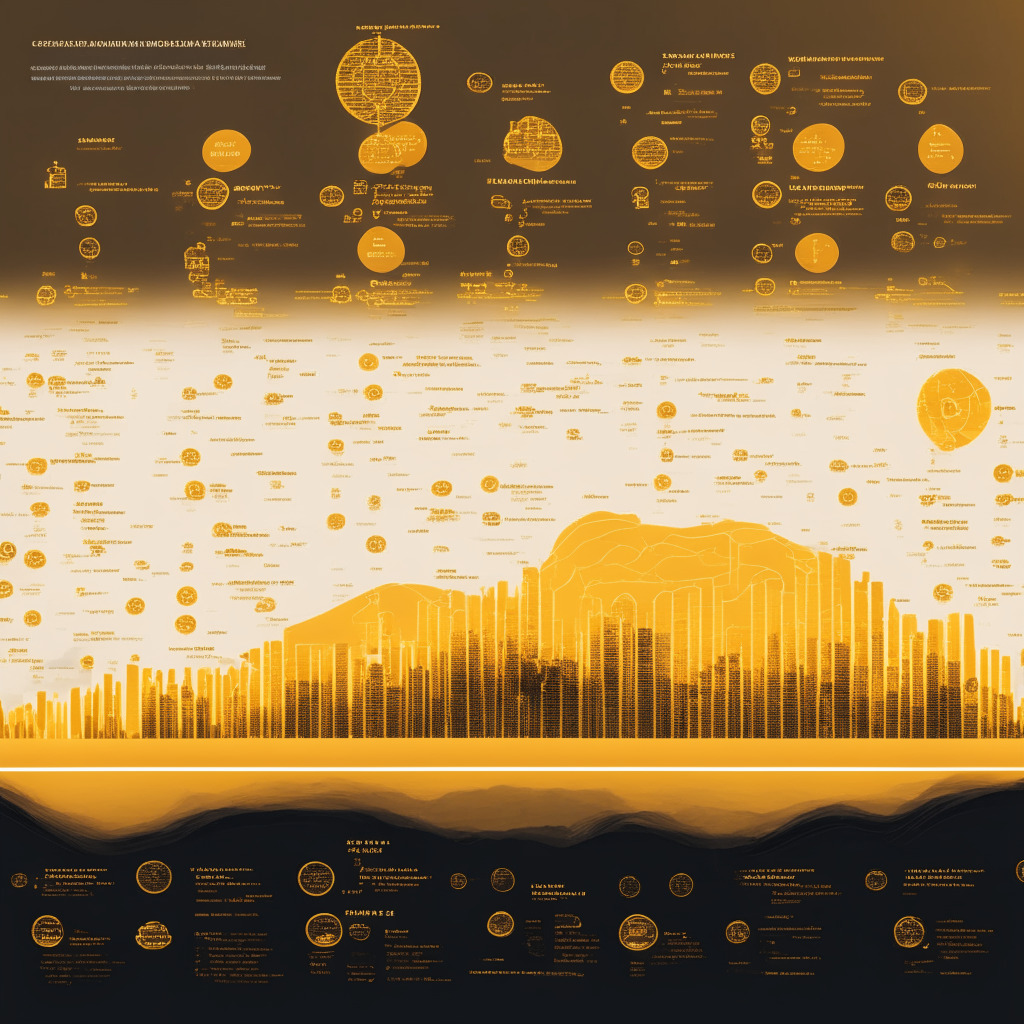“Swiss entity Backed has launched its latest product, bIB01, on the Base blockchain, offering a digital engagement tool for traditional finance enthusiasts. Backed’s tokenized securities, or bTokens, represent real-world assets like corporate bond ETFs and treasury ETFs. Despite limitations for US-based investors, this marks an intriguing merger of traditional assets with digital technology.”
Search Results for: Tokenization
CBDCs: A Cornerstone for Future International Monetary System & the Tokenization of Finance
The Banque de France views central bank digital currency (CBDC) as a crucial component for the new international monetary system, enhancing cross-border payments. It’s being considered from an international perspective right from the outset. Two potential development pathways include building interoperability with legacy systems and creating regional or international platforms for CBDCs.
The Balancing Act of Tokenization: Bridging Blockchain and Traditional Finance Amid Regulatory Challenges
“Tokenization, or representing real-world assets as blockchain tokens, offers advantages like easier asset management. However, firms must comply with regulation standards, understand duties linked to tokenized assets’ public offerings, and regularly audit assets. An adaptable compliance solution is crucial, given the evolving nature of token regulation.”
Understanding the Steady Surge and Potential Challenges in Blockchain Mining and Tokenization
“In the evolving world of blockchain, Bitfarms, a leading Bitcoin miner, intensified its mining operations in September, producing over 400 bitcoins. However, the company’s mining rate decreased compared to the previous year, illustrating a challenging mining environment. Meanwhile, UBS bank launched a pilot of a tokenized fund, emphasizing further advancements in blockchain and cryptocurrency space.”
Ethereum’s Real-World Ascent: UBS Tokenization and What It Means for Blockchain Future
“UBS bank launches a live pilot of a tokenized money market fund on Ethereum, aiming to democratize market liquidity. The project brings together traditional financial institutions and fintech providers. However, tokenization faces challenges such as asset valuation transparency and blockchain complexity.”
Exploring Tokenization: The Future of Asset Management or a Risky Venture?
“Tokenization, the process of translating ownership rights of assets into digital tokens on a blockchain, is revolutionizing traditional finance by streamlining payment mechanisms, creating programmable smart contracts, and ensuring secure, transparent ledgers. This conversion into non-fungible tokens (NFTs) promises simplified, optimized payments for artists, content creators, and sports personalities.”
Harnessing the Power of Tokenization: Future of Asset Management and The Uncertainties Ahead
“Tokenization, referring to the conversion of asset ownership rights into digital tokens on a blockchain, is revolutionizing securitization according to Jenny Johnson, CEO of Franklin Templeton. It opens up new possibilities for alternative investment vehicles with its incorporation of a payment mechanism, programmable smart contracts, and a source of truth embedded in a decentralized ledger.”
The Impending Revolution of Asset Tokenization: Promises and Challenges
“Tokenization of assets, estimated to reach a value of $16 trillion by 2030, offers immense potential in democratizing finance. It allows for fractionalized investments, expanding opportunities to the general population. However, integration of blockchain without disrupting existing services poses a significant challenge.”
Crypto Market in Slumber: Spot Trading Hits Historic Low VS Evolution of Tokenization & ETFs
“Crypto spot trading hits its lowest point since March 2019, with a 7.78% slump in volume on centralised exchanges. Tokenization in finance is emerging from South Korea, aiming to enhance transaction efficiency and transparency. However, with a decrease in worldwide search queries for “cryptocurrency”, there is a shrinking general interest in digital assets, potentially forecasting a bearish market trend.”
Unleashing the Trillion-Dollar Future: Blockchain, Tokenization and Global Finance
“Mirae Asset Securities partners with Polygon Labs to promote Web3 tech adoption via tokenizing finance. The partnership seeks to overcome challenges such as steep learning curves and global regulatory disparities. The Mirae-led initiatives aim to foster interoperability between financial systems and propose a forward-thinking approach to digital finance.”
Leveraging the Crypto Winter: The Dawn of Tokenization and a Programmable Web3 Economy
“The future of Web3 technology lies in tokenizing real-world assets (RWAs), potentially unlocking the next crypto surge. Blockchain is already being used by financial institutions for RWA tokenization, creating transparent transactions while reducing intermediaries. However, challenges remain in bridging the physical-digital divide.”
Transforming Bond Markets: Tokenization Prospects & Challenges in Hong Kong
The Hong Kong Monetary Authority is exploring the benefits and challenges of tokenizing bonds, a process aligning with existing legal infrastructure and improving operational efficiency via a common Distributed Ledger Technology platform. However, the report cautions that tokenization’s adoption is still in its “infancy”, with obstacles like aligning financial institutions on common solutions and updating legal regulations. This development frames Hong Kong’s shift towards becoming a crypto hub.
Harnessing Tokenization: HKMA’s Bold Steps and Uncharted Terrains in Bond Markets
“Hong Kong Monetary Authority (HKMA) has issued a $100 million tokenized green bond, proving the feasibility of Distributed Ledger Technology (DLT) in capital market transactions. DLT could help improve transaction speed, market fluidity, and transparency in bond markets. However, challenges of fragmentation across platforms, systems, and regulatory frameworks still demand attention.”
Navigating the Tokenization Wave: Growing Value and Unique Challenges in Blockchain-based Assets
Tokenization uses blockchain to monetize tangible and intangible assets, making them tradable and transparent. Despite cryptos’ ridicule for lack of tangible value, blockchain’s potential to transform assets is increasing. There’s even exploration of derivative, swap, and fixed income security systems. Companies like Pendle Finance and Dinari are demonstrating this potential, while concerns rise about tokenizing user engagement. Elsewhere, Central African Republic is aiming to tokenize its fiat money, a move that could inspire other countries.
Friend.tech’s Privacy Breach: A Concern for Social Network Tokenization
Friend.tech, a platform for tokenizing social networks, recently suffered a significant privacy breach. Data from over 101,000 users was disclosed on GitHub, including Twitter usernames linked to Base wallet addresses. This alarming episode has raised serious questions regarding data protection and privacy within the growing world of blockchain technology.
Dinari Revolution: Embracing Blockchain Stock Tokenization Against Regulatory Challenges
“Dinari, a blockchain-based stock trading platform, has gained preliminary regulatory approval to tokenize stocks. This is a significant step forward in asset tokenization. Dinari’s plans are to simulate the US stock market within securities laws criteria.”
Untangling Asset Tokenization: Promising Innovation or a Risky Venture?
“Asset tokenization firm Securitize has acquired a digital asset wealth platform, Onramp Invest, intending to enable registered investment advisors to buy digital tokens. However, growing concerns around risk underscore the need for caution in the decentralised finance (DeFi) world.”
Democratizing Finance: The Potential Role of Blockchain and Tokenization
“Blockchain technology’s potential lies in tokenization’s ability to democratize finance by offering broader investment options via fractionalized investments. By applying an ETF-like structure to alternative investments such as real estate and private equity, blockchain can offer liquidity, transparency, and efficiency, enhancing investor portfolios. Major institutions are already exploring tokenization, potentially creating a trillion-dollar digital securities market.”
Revolutionizing Finance: Blockchain and the Future of Asset Tokenization
“Blockchain technology has the potential to revolutionize financial assets trading by tokenizing real world assets. This process can enhance liquidity, reduce costs, and improve risk management. However, with the goal of benefiting economic growth and SMEs, a more standardized tokenization process must also accurately represent financial obligations, liabilities, and cash flows.”
Navigating the Future of Freelancing with DeeLance: Blockchain Integration and NFT Tokenization
“DeeLance, a blockchain-based freelance platform, offers transparency, security, and new NFT applications for tokenizing work products. Its decentralized nature combats issues like excessive commission fees, unclear deals, and entry barriers, fostering a healthier and fairer ecosystem for freelancing.”
Navigating the Avalanche: Tokenization’s Transformative Potential and Tough Challenges
“Avalanche Foundation’s recent announcement of a $50M initiative, ‘Avalanche Vista’, is generating interest. It focuses on the tokenization of assets on the Avalanche blockchain, democratizing investments. While promising, concerns about asset suitability, regulatory uncertainties, and security issues need careful attention.”
Unleashing the Potential of Tokenization: A Revolutionary Shift in Global Finance
“Tokenization transforms tangible or intangible real-world assets into virtual investment vehicles on the blockchain. Stocks may be traded round-the-clock, much like cryptocurrency. While tokenization sounds transparent and risk-free, it has potential pitfalls. However, traditional financial institutions can’t ignore the potential benefits of blockchain any longer.”
Ripple’s Venture: Exploring Tokenization’s Potential in the Real Estate Industry
Ripple Labs announced its venture to transform the real estate sector via tokenization, using the Ripple’s CBDC platform to tokenize real estate holdings for use as loan collateral. This innovative method aims to revolutionize conventional asset management and ownership, improving liquidity, accessibility, and security despite possible regulatory challenges and security concerns. The implementation of blockchain-based tokenization could profoundly reshape traditional systems and industries.
Unleashing Blockchain’s Potential: Tokenization Revolution Amidst Digital Asset Landscape Tensi
“Tokenization, an application of blockchain that turns real-world assets into blockchain-based tokens, could revolutionize infrastructures and markets in the next decade according to Bank of America. However, they also anticipate the disappearance of 99% of current tokens due to inherent risks.”
Public vs Private Blockchains: Leveraging Permissioned Systems for Secure Asset Tokenization
The potential of blockchain technology in improving settlement through asset tokenization is acknowledged, but skepticism arises about the viability of public blockchains. The solution lies in public permissioned blockchains, which provide security, scalability, transparency, and regulatory compliance while preserving decentralization. These blockchains are beneficial for financial markets and decentralized finance (DeFi) onboarding with the right infrastructure.
The Future of Tokenization: CBDCs, Decentralization, and Global Monetary Landscape
The IMF and BIS published reports discussing the future of the monetary system and the potential impact of crypto and central bank digital currencies (CBDCs) on tokenization. Tokenization represents claims digitally on a programmable platform, integrating records of underlying assets with their transfer rules and logic. The reports emphasize tokenized CBDCs’ role in maintaining settlement stability and “singleness of money.”
Transforming iGaming with Blockchain and Tokenization: Pros, Cons, and Main Conflict
The TFS Token native to Fairspin casino, built on blockchain technology, offers transparency, unique earning possibilities through staking programs, and dual compatibility with Ethereum and BNB Smart Chain networks, setting it apart from other iGaming assets.
Tokenization Revolution: Unleashing Potential and Overcoming Challenges in the Digital Age
At the World Token Summit, experts discussed tokenization’s potential to revolutionize industries through benefits like asset fragmentation and digital identities. Despite challenges in technology and KYC processes, advancements in forensic analysis and embedded identity solutions may boost tokenization adoption and transform various sectors, including real estate.
Regulatory Debates Shape Crypto’s Future: Institutional Adoption and Tokenization at Stake
A recent survey by crypto company Laser Digital revealed that 82% of respondents hold a positive view of the digital asset class, with optimism for Bitcoin and Ether performance. However, 90% prefer investment vehicles backed by large traditional financial institutions, highlighting the need for increased regulatory clarity and market experimentation for digital assets and traditional finance to coexist and benefit investors.
Exploring the $5 Trillion Tokenization Opportunity: Benefits, Challenges, and Key Players
Tokenization is predicted to reach a massive $5 trillion opportunity over the next five years, with leading forces including stablecoins, CBDCs, private market funds, securities, and real estate. However, regulatory challenges and market volatility could significantly impact its realization.
Tokenization: Unlocking a $5 Trillion Market or Stumbling on Regulatory Uncertainty?
Tokenization, the process of converting real-world assets into blockchain-based tokens, offers opportunities such as operational efficiencies, improved liquidity, and market accessibility. However, regulatory uncertainty remains a significant challenge as the approach of policymakers will influence the future success of this growing market.
Tokenization’s Future: Balancing Decentralization, Security, and Scale in Finance
Michael Hsu, acting head of the U.S. OCC, acknowledges tokenization’s potential in transforming finance but expresses concerns over decentralized blockchains. He suggests that centrally operated, trusted blockchains can achieve security and scalability, emphasizing the importance of a legal framework to support tokenization and interoperability with existing financial systems.































